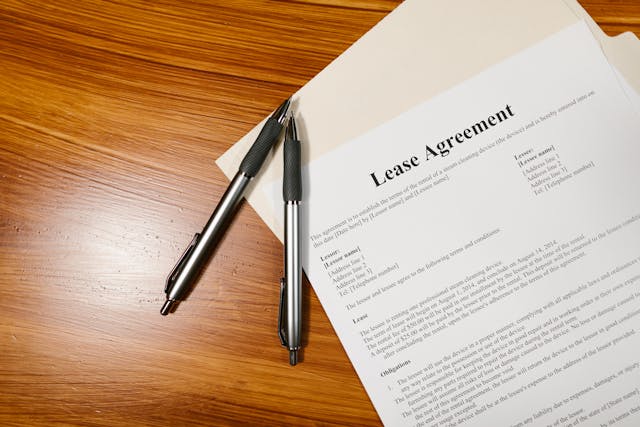Before advertising your rental unit or signing a rental agreement, it’s crucial to understand your legal responsibilities as a Florida residential landlord.
Chapter 83 Part II of the Florida Statutes outlines the rules governing the landlord and tenant relationship, including each party’s rights and duties, as well as key regulations related to habitability, security deposits, disclosures, and evictions.
These laws also establish procedures for rent payments, future rent payment periods, and the proper handling of disputes.
This guide, from Gulf Income Properties, covers the most important basics to help you stay compliant and protect your investment.
Required Landlord Disclosures
As a landlord, you must provide your tenants with the following disclosures. You can include them either as part of the written rental agreement, or as a separate attachment.
Concentrations of Lead-Based Paint: This federal law applies to landlords renting out units built in 1978 or before.
Contact Details: Include means of contacting the owner of the property, or any person tasked with its management.
Deposit Information: How the deposit is stored and whether the tenant is entitled to any interest. This disclosure only applies to landlords renting out five or more units.
Radon Gas: Whether or not it is present in or near the rental unit.
Tenants’ Rights and Responsibilities in Florida
A tenant in Florida automatically acquires the following rights after establishing a written contract with a landlord. Which can come about if there is a written lease agreement, a verbal rental agreement, or after receiving periodic rental payments under the Florida landlord tenant act.

Tenants Rights
In Florida, tenants are entitled to a range of protections that ensure fair and respectful treatment throughout their rental experience.
They have the right to live in a safe and habitable rental and must be given all necessary disclosures before moving in. They may not simply withhold rent unless a legally valid reason applies and proper written notice is provided to the landlord.
If a contract needs to be ended, tenants can terminate their tenancy with proper notice or break the lease for a legally valid reason. Their security deposit must be handled responsibly, and any eviction process must be fair and just.
Tenants are also protected under the Fair Housing Act, which guarantees equal treatment regardless of background.
Additionally, Landlords shall provide at least 24 hours’ reasonable notice before entering the rental property, helping preserve the tenant’s privacy and peace of mind.
Tenant Responsibilities
Tenants have a responsibility to uphold their end of the rental agreement by making rent payments on time and following all terms outlined in the rental contract.
They are expected to keep the unit clean and sanitary, maintain dwelling unit, and avoid causing any intentional damage. If they plan to terminate the rental agreement, periodic tenancy or break a fixed-term lease, they must notify the landlord in advance.
Tenants should also allow the landlord to enter the unit for valid reasons, respect the peace and quiet of the neighborhood, and ensure any required fees under the contracts are paid within the designated time frame.
Landlord Rights & Responsibilities in Florida
After establishing a rental agreement with a tenant in Florida, the landlord automatically acquires certain rights.
Landlords Rights
Landlords in Florida have several rights that help them manage their rental properties effectively.
the landlord may enter the rented premises for valid reasons, such as inspecting the unit, responding to repair requests, or showing the rented unit to prospective tenants.

Landlords can also charge a security deposit before a tenant moves in, as well as impose reasonable fees outlined in the rental agreement. They also have the right to raise the rent by any amount and as often as they choose, provided proper notice is given.
Landlords may hold tenants accountable for all rental payments due under the lease and have the authority to evict those who violate its terms.
Additionally, a Florida landlord can terminate a agreement by serving the required notice and are not obligated to renew a periodic or fixed-term lease agreement once it ends, regardless of the reason.
Landlord Responsibilities
Landlords in Florida have a number of responsibilities designed to ensure fair and lawful rental practices.
They must provide tenants with a safe, habitable home and follow proper legal procedures when removing a tenant from the rental, including having a justifiable reason for eviction.
Landlords are required to handle deposits in accordance with state regulations and treat tenants fairly.
In addition, landlords must comply with the Florida Fair Housing Act, which prohibits discrimination in housing-related activities and ensures all tenants are treated equally regardless of race, color, religion, sex, disability, familial status, or national origin.
Landlords must also give at least 24 hours’ notice before entering the rented unit and may not charge a late fee exceeding $20 or 20% of the monthly rent, whichever is greater.
Overview of the Florida Landlord-Tenant Law
Here are some key components of the Landlord-tenant Laws in Florida:
Habitability Requirements
Under Florida landlord-tenant law, a landlord and tenant agreement requires the personal property to be habitable. That is, one that meets the state’s basic health, safety, and building code requirements.
Among other things, this means that the dwelling unit must have running hot water, working detectors, and be mold or pest free.
If a Florida landlord fails to meet these requirements can result in tenants giving proper written notice to withhold rent or pursue legal remedies.

Part of meeting the habitability requirements is responding to repair requests promptly. Specifically, the landlord must respond within 7 days of a tenant sending proper written notice to the landlord's address.
Tenant Evictions
As a landlord in Florida, you can only evict a tenant early from the tenancy for the following reasons.
Failing to pay rent on time.
Staying on the personal property without a lease.
Violating a term of the lease.
Regardless of having such ‘just’ reasons, you must follow the proper eviction procedure. You must not try to use any other method, such as self-help methods, retaliatory evictions, or evictions based on a tenant’s fair-housing-protected class.
Eviction may involve court costs for both the landlord and tenant in the process of regaining possession of the dwelling unit.
Security Deposits
Certain Florida law apply in the collection and handling of tenants’ security deposit money in Florida. Including:
Holding the Deposit: You must hold the deposit in either a normal account, an interest-bearing account, or by posting a surety bond.
Only Make Allowable Deductions: You can only make deductions from certain expenses like unpaid rent, or damage exceeding normal wear and tear.
Security Deposit Return: Landlords must return the deposit within 15-30 days after the tenant has moved out.
Breaking the Lease
Depending on the reason, tenants may or may not have a legally justified reason for early lease termination.
In Florida, justifiable reasons for termination of rental agreement include the following:
Starting active military service
Habitability violation
Early lease termination (if in the lease)
Landlord harassment
Privacy violation
Rental agreement violation
The tenant also has a responsibility to provide an advance notice and any relevant supporting document where necessary.
Bottom Line
Understanding your rights and responsibilities as a landlord claims under Chapter 83 of the Florida Statutes is essential before leasing out your property.
From providing a habitable home and handling security deposits properly to following legal procedures for evictions, compliance is key to protecting your investment and maintaining positive landlord tenant relationships.
If you need expert support navigating Florida’s landlord-tenant laws or want to take the guesswork out of managing your rental, Gulf Income Properties is here to help.
Please note that the information provided in this blog is intended for general guidance and should not be considered as a replacement for professional legal advice.
It is important to be aware that Florida law pertaining to property management may change, rendering this information outdated by the time you read it.


